26 January 2012
“This is the time you get into when you go to sleep and have a dream that talks about permanent conditions within your own psyche as they relate to the temporal conditions of your life right now.”
En mi sueño de hace dos noches estaba en Taiwán con Pamela. Estábamos allí de vacaciones, era el verano, pero los días libres se habían terminado y estábamos en el aeropuerto, esperando nuestro vuelo. Llegamos tarde y en el ajetreo encontré a una chica taiwanesa que conocí en agosto pasado. Yo no la reconocía, pero ella sí y me saludó muy efusivamente así que aparenté reconocerla y me dije que después la buscaría en Facebook. El vuelo estaba atrasado así que teníamos que esperar y haciendo el recuento de nuestras maletas nos dimos cuenta que Pamela había dejado olvidada una bolsa con mis tennis de deportes adentro. Yo le reclamaba eso y nos terminábamos peleando, por lo que salí al jardín a tomar aire y leer un poco. Fue allí cuando vi el avión que nos iba a llevar a nuestro destino de regreso: era una serie de cabinas de casas rodantes, con dos grandes alas metálicas amarradas a una de las cabinas con una cuerda muy gruesa. Recuerdo que el viaje tuvo muchas turbulencias pero fue muy corto, como de la isla Kinmen a Taipéi, así que imagino que era allí que llegábamos.
Anoche soñé que estaba en mi casa en Honduras, con mis papás y que mi abuela estaba viva todavía. Estaba quedándose en mi casa porque se sentía un poco enferma, pero por alguna razón yo estaba empacando para irme a su casa en Juticalpa por una semana. Tenía que apurarme porque iba a perder el bus, pero no lograba decidir qué llevar y qué no llevar entre toda la ropa que tenía. No entiendo qué era lo que yo iba a hacer en Juticalpa, ya que sin mi abuela allí no había razón para que yo fuera, pero extrañamente tenía prisa por irme. Mi sueño terminó antes de que terminara de empacar.
Últimamente no estoy durmiendo muy bien. No estoy funcionando muy bien durante el día tampoco. Me siento un poco como una zombie, haciendo a duras penas las cosas que debo, pero no de la forma más eficiente y no en la programación en la que debería estarlas haciendo. Me angustia mucho un poco lo que vaya a pasar después de junio y el futuro se ve tan borroso que no logro concentrarme en el presente. Siento que no tengo tiempo, que esta es una carrera y que voy muy atrasada, tengo miedo de dejar pasar las oportunidades. Sé lo que quiero pero no sé cómo lo puedo conseguir cuando hay tantos factores externos en los que mis capacidades no ejercen casi ninguna influencia. Me siento como al borde de un abismo, viendo hacia abajo un gran vacío. Hay tanto en juego y yo apenas soy una humana, impotente ante el juego caprichoso de los dioses, los Espíritus del Bosque, lo que sea que termina determinando lo que va a pasar después.
In my dream two nights ago I was in Taiwan with Pamela. We were there on vacation, it was summer, but the holidays were over and we were in the airport, waiting for our flight. We got there late and while rushing in I ran into this Taiwanese girl I met last August. I didn’t recognize her but she did and she said hello to me so effusively that I faked recognizing her and thought to myself that I would look her up on Facebook later. The flight got delayed so we had to wait and checking up on our bags we realized Pamela lost a black bag with my running shoes in it. I yelled to her about it and we ended up fighting, so I went outside to a garden to get some fresh air and read a little. That’s where I saw the plane that would take us to our destination: it was a series of caravan cabins, with two huge metal wheels tied to one of the cabins with a very thick rope. I remember the flight having lot turbulences but very short, like the one from Kinmen Island to Taipei, so I guess that’s where we went.
Last night I dreamt I was at home in Honduras, with my parents and that my grandma was still alive. She was staying at my house because I felt a little ill, but for some reason I was packing to go to her house in Juticalpa for a week. I had to rush because I was going to miss the bus, but I couldn’t decide what to take from all of the clothes I had. I didn’t understand what I was going to do in Juticalpa because without my grandma there, there was no reason for me to go, but I was desperate to leave. My dream ended before I finished packing.
I haven’t been sleeping very well lately. I’m not functioning well during the day either. I feel like a zombie, hardly doing the things I should but not in the most efficient way and not according to the schedule I had them planned. I’m very a little worried about what is going to happen after June and the future looks so blurry that I can’t concentrate on the present. I feel that I don’t have time, that I’m in a race where I’m already late, I’m afraid I’m letting opportunities go. I know what I want, but I don’t know how to get it when there are so many outside factors in which my abilities have little influence in. I feel on the edge of a cliff, looking down on a great void. There is so much at stake and I am barely a human, helpless before the capricious game played by the gods, the Wood’s Spirits, or whatever it is that is going to determine what is happening later.
Estimado lector, ¿está usted viviendo en Francia, considerando venirse a vivir a Francia o tiene a Francia en su lista de lugares de ensueño para irse a vivir después de la jubilación? ¿No logra dormir por las noches anticipando el shock cultural? ¿Está cansado de que lo traten como un turista a pesar de tener más de un año y medio viviendo aquí? ¿Quisiera conocer de una vez por todas el significado de todas esas expresiones extrañas que nunca le enseñaron en sus clases de la universidad o de la Alianza Francesa pero que no se atreve a preguntar qué significan porque eso sólo reforzaría su imagen de extranjero extraviado? Pues no busque más, tenemos un libro escrito específicamente para usted.
Charles Timoney escribió lo que ahora considero “El libro que todo Erasmus debe leer”, o por ende toda persona que espera pasar más de una semana en Francia. Encontré su libro llamado “A certain je ne sais quoi… The ideal guide to sounding, acting and shrugging like the French” por pura casualidad en el Museo de la Armada, pero luego de varios infructíferos meses de buscar libros que me ayudaran a entender mejor este extraño país donde estoy viviendo. Timoney es lo que podría considerarse un experto en la materia: aunque originario de Inglaterra, tiene más de treinta y cinco años en Francia, está casado con una francesa con quien tiene dos hijos y es el autor de una especie de diccionario de expresiones locales. En este libro, más que darse a la tarea de descifrar los misterios de la lengua, se concentra en la cultura, que clasifica según sus categorías. Trata de varios temas, desde los más serios e importantes, como por ejemplo una breve introducción a la historia local, hasta cosas que podrían parecer irrelevantes pero que ya en la vida diaria están lejos de serlo. Es el caso de las reglas básicas para los saludos, cómo no parecer un turista, cómo comer y beber, y cómo saber a quién tratar de “usted” o de “tú”, algo más difícil de lo que pueden explicar en cualquier curso de idiomas.
Gracias al buen humor de Timoney, uno es capaz de identificarse con varias cosas de las que dice. Al parecer la incomprensión hacia los franceses aplica también a otros europeos. Sus experiencias personales que acompañan este libro que oscila entre la comedia y la auto-ayuda nos sirven para que no repitamos los errores que él cometió. Sobra decir que jamás en mi vida volveré a pedir un “café au lait” en público. Todavía siento vergüenza de no haber sabido antes que es un término que me condena al ostracismo más que mi color moreno de piel, mi tendencia a hablar más fuerte que los demás y mi predilección por la comida condimentada. Me siento mucho más tranquila después de haber leído el libro y lo único que deseo es haberlo podido leer justo antes de venir. Mi vida hubiera sido mucho más fácil entonces.
Continuando con la temática del mimetismo cultural, finalmente tuve entre mis manos “La Parisienne” de Inès de la Fressange, una antigua modelo que ahora se da a la tarea de predicar el evangelio del estilo parisino a las incapacitadas del gusto como yo. Desde que supe que el libro existía me moría por leerlo, porque si hay una sola cosa que quisiera aprender de mi estadía en Francia es a vestirme bien. El noventa por ciento de la gente en las calles parece recién salida de un desfile de moda y lo más irónico es que ni siquiera pareciera que están haciendo un esfuerzo. Eso sería comprensible si sólo fueran las mujeres las que se ven bien, pero hasta los hombres viven con una preocupación por su apariencia física que yo antes atribuía sólo a David Beckham. Eso es lo que yo llamo presión externa en su máximo esplendor, pero la verdad es que con los descuentos anuales es totalmente factible tener un bonito guardarropa, si es que acaso se sabe escoger bien. Así que no quería desaprovechar la ocasión de leer un libro exclusivamente sobre el arte de vestirse adecuadamente, tranquilizada por el hecho que es uno de los best-sellers del año pasado, a pesar que fuera de París, nadie quiere o soporta a los parisinos. Me dije que tenía que realmente tenía que ser bueno.
De la Fressange habría de probarme lo contrario. Para empezar, dedica sólo unas cuantas páginas a las piezas que ella considera “esenciales” para una parisina. Bailarinas, marinera, trench coat, suéter azul marino… Muchos de ellos son totalmente obvios, es decir, no necesito un libro para saber que necesito tener por lo menos un jean; otros son completamente innecesarios, puedo vivir un día más sin tener mocasines. Pero lo peor es que rápidamente el libro se degenera en los lugares adónde irse a cortar el pelo en París, los spas que ella recomienda, las tiendas de decoración, de joyas, los cafés, restaurantes y hasta hoteles que le gustan. Porque el libro termina siendo un desfile de “sus cosas y lugares favoritos”, o cómo promocionar a sus mejores amigos. Y con toda franqueza, para ver publicidades de cosas que voy a tener que esperar muchos años para poder pagar mejor me compro una revista a un euro con cincuenta centavos. Detesté el tono condescendiente que no deja de emplear durante todo el libro, lleno de afirmaciones que rayan en lo ridículo o hasta en lo humorístico porque no puede ser posible que esté hablando en serio. En un momento habla del desprecio que sienten las parisinas por tener ese último objeto a la moda por el que se necesita estar en lista de espera (“so vulgaire!” fue la expresión que utilizó) y unas páginas más adelante habla de cómo finalmente se compró esa cartera por la que se tiene que esperar años para tener. Pero la apoteosis de la estupidez fue cuando en su lista de las que según ella son las mejores librerías de París explica que la parisina compra muchos libros… pero nunca tiene tiempo para leer. Decepción total. Simone de Beauvoir está vomitando en el cielo en este momento. Es cierto que quiero comprender la cultura a la que estoy expuesta, quiero integrar todo aquello que me parezca lo más útil o lo más hermoso, pero francamente, no al precio de mi intelecto. Inès de la Fressange: quiero mis neuronas de regreso. Espero tener más suerte con “French women don’t get fat”.
Dear reader, are you currently living in France, thinking about coming to live in France or is France in your list of dream places to live after retiring? Are you unable to sleep at night anticipating the cultural shock? Are you tired of being treated like a tourist even though you have more than a year and a half living here? Would you like to know once and for all the meaning of all those weird expressions you never learned in college or in the French Alliance but never dare to ask what they mean because that would only reinforce your stranded foreigner look? Well, search no more; we have a book especially written for you.
Charles Timoney wrote what I now consider to be “the book every Erasmus must read” or for that matter, any person planning to spend more than a week in France. I found his book titled “A certain je ne sais quoi… The ideal guide to sounding, acting and shrugging like the French” by pure chance in the Army museum, but only after many unsuccessful months looking for books that could help me understand better this strange country I’m living. Timoney is what could be considered an expert in the field: in spite of the fact that he’s from England, he has more than thirty-five years in France, he is married to a French woman with whom he has two kids and he’s also the author of a sort of local expressions dictionary as well. In this book, more than facing the task of deciphering the mysteries of the language, he concentrates on the culture which he classifies according to categories. He writes about many subjects, from very serious and important ones such as a brief introduction to local history, to things that could seem irrelevant but that in real life are far from being so. That is the case of the basic rules for greeting people, how not to look like a tourist, what to eat and drink, how to know whom to call “vous” and whom to call “tu”, something much more difficult that can be explained in a language course.
Thanks to Timoney’s good sense of humor one is able to identify with many things he says. Apparently incomprehension towards the French applies to other Europeans as well. His personal experiences that fill this book, which oscillates between comedy and self-help, warn us how not to make the same mistakes he did. Needless to say, I will never again order a “café au lait” in public. I still feel ashamed of not knowing that this is a term that condemns me to be ostracized even more than for the brown color of my skin, my tendency to speak louder than others and my preference for spicy food. I feel much calmer after reading this book and the only thing I wish is that I had read it before I came here. It would have made my life easier back then.
Continuing with the cultural mimesis theme, I finally got ahold of “La Parisienne” by Inès de la Fressange, a former model now preaching the Gospel of Parisian style to taste incompetents like me. Ever since I knew the book existed I was dying to read it since if I had to learn only one thing from living in France is how to dress properly. Ninety percent of people in the streets look like they just came out of a fashion show and ironically; they don’t even seem to be making an effort to do so. That would be understandable if only women were the only ones who looked good, but even men are worried by their physical appearance in a way I used to think only David Beckham did. That is what I called external pressure in its maximum splendor, but the truth is that with the annual sales it is possible to have a nice wardrobe, if you can only choose wisely. So I didn’t want to waste the opportunity to read a book completely devoted to looking good, backed-up by the fact that it was one of last year’s best-sellers in spite of the fact that out of Paris, no one loves or even stands Parisian people. I said to myself that the book must be good.
De la Fressange would prove the contrary. For starters, she devotes only a few pages to the pieces she considers “essentials” for a Parisian girl. Ballet flats, striped shirt, trench coat, blue marine sweater… Many of them are totally obvious, I mean, I don’t need a book to know that I need at least one jean; others are completely unnecessary, I can still live a day longer without having moccasins. But the worst part is that the book quickly degenerates into the places in Paris where she likes to get her hair done, the spas she recommends, the decoration stores, jewelry shops, cafés, restaurants and even hotels she likes. Because the book ends up being a parade of “her favorite things and spots” or how to promote her best friends. And frankly, if I wanted to see advertisings of things I’ll have to wait many years to be able to buy I would have bought a magazine that would cost me only a euro and fifty cents. I hated the condescending tone she uses all throughout the book, full of affirmations that border on ridiculous or even in jokes because she couldn’t possibly be serious. In a certain part she talks about the disdain Parisians feel about having that latest fashion thing you have to be in a waiting list to get (“so vulgaire!” is the expression she used) and a few pages later she talks about how she finally bought that purse that you have to wait years to get. But the apotheosis of stupidity was when she gave the list of what she considers to be the best libraries in Paris and later she explained that Parisians buy many books… but never have time to read. Total disappointment. Simone de Beauvoir is puking in Heaven right now. It’s true that I want to understand the culture I’m being exposed to, I want to integrate everything that I find useful or beautiful, but frankly, not at the cost of my intellect. Inès de la Fressange: I want my brain-cells back. I hope I’ll be luckier with “French women don’t get fat”.
Siempre he creído que la vida es una eternal lección en humildad, o mejor dicho, en cómo tragarte todas las cosas que has dicho alguna vez. Como por ejemplo mis afirmaciones radicales en la adolescencia de cómo nunca dejaría que un chavo se interpusiera en una amistad, o cómo siempre, en un triángulo amoroso, sería solidaria hasta la muerte con la otra chava y nunca con el chavo. Todavía recuerdo cómo decía que ningún hombre vale la pena como para pelearse por él y que sentía mucha lástima por esas mujeres que pierden su tiempo y dignidad corriendo detrás de un tipo que retoza del gusto por encontrarse como objeto del deseo de dos personas al mismo tiempo.
Puede sonar curioso, pero la primera vez que me involucré con una persona “cotizada” mis rivales eran un montón de niñas católicas y santurronas con las que yo no tenía ninguna relación. Dormía muy bien por las noches sabiendo que si algún día me dejaba por una de ellas, no hubiera sido una pérdida tan grande. Era lo equivalente a que un chavo me dijera que me deja por otro hombre: estaría en paz sabiendo que necesitaba algo que yo no le podía dar.
La segunda vez que me sentí amenazada fue diferente porque esta vez se trataba de una amiga. No había señales de ningún tipo, al final el escenario estaba todo en mi cabeza, pero estaba en esa etapa en que la relación es nueva y frágil y uno cree que se puede esfumar con cualquier viento mal direccionado. Yo reconocía lo absurdo de mi paranoia; ni siquiera era capaz de admitirla, de discutirla, analizarla y dejarla ir, como generalmente es el protocolo a emprender en caso de pensamientos obsesivos. Sobra decir que cuando salió a la superficie lo hizo de la manera menos apropiada y menos elegante posible. Una noche en la que hubo mucho alcohol de por medio terminé llorando en un baño, con Moisés, el único que autoricé a verme en ese estado. Pero, por obra de magia, el evento se esfumó, mi amiga no se enteró de mis celos (espero) y la relación vivió para contarlo.
Probablemente era más sabia en la adolescencia de lo que lo soy en estos momentos. A estas alturas de mi vida me digo que, efectivamente, no hay amistad que valga la pena perderse por un hombre. ¿Pero qué sucede si no hay una amistad que perder? Yo hubiera creído que la solidaridad y el respeto eran suficientes impedimentos para evitar situaciones comprometedoras, pero estoy viendo que no necesariamente es así. Y que conste, no es el objeto en sí, es el hecho que alguien se atreva a ponerme en esta situación. Al final, hay cosas que yo no puedo controlar y que debo dejar ir, en algún momento. Lo único que puedo controlar es mi reacción, mi reacción a este ataque de rabia que estoy sintiendo.
Se dice que los celos son inseguridad. Inseguridad de no ser lo suficiente bueno, de no estar a la altura. Que cuando uno más se aferra a algo es cuando más se corre el riesgo de perderlo. Es por eso que el proverbio dice “Déjalo ir y si regresa es tuyo, si no, nunca lo fue”. Pues yo lo dejo ir, pero estoy empezando a creer que el código de Hammurabi fue también el primer manual para relaciones interpersonales, así que yo también me iré por otro lado.
I have always believed that life is an eternal lesson in humility, or better said, in how to swallow everything you have ever said. Like for example, my teen radical statements about how I would never let a guy interfere in a friendship, or how always, when involved in a love triangle, I would remain loyal to the other girl but never with the guy. I still remember how I used to say that no guy is worth fighting over with someone else and how sorry I felt for all of those women who waste their time and dignity running for some dude who enjoys being the object of desire of two people at the same time.
It may sound strange, but the first time that I got involved with a “sought-after” person my competition was a bunch of catholic, goody two-shoes girls with whom I had no relationship whatsoever. I slept very well at night knowing that if he ever broke up with me over one of them it would not have been such a great loss. It was the equivalent of a guy leaving me for another man: I would be in peace knowing that he needed something I could not give him.
The second time I felt threatened it was different because this time it was with a friend. There were no signals of any kind, in the end the story was in my head, but I was in that stage where the relationship is new and fragile and you think it can disappear with any light breeze. I knew how absurd my paranoia was; I couldn’t even acknowledge it, discuss it, analyze it and let it go, as the general protocol for obsessive thoughts is. Needless to say, when it finally came to the surface it was not in the most appropriate or elegant way. One night, when there was a lot of alcohol involved, I ended up crying in a bathroom, with Moisés, the only one I authorized to see me in such a state. But magically the event disappeared, my friend never knew I was jealous (or so I hope) and the relationship lived to tell the story.
I was probably wiser in my teenage years that what I am right now. At this stage in my life I say to myself that, indeed, there is no friendship worth losing over a guy. But what happens if there is no friendship in the middle? I would have thought that solidarity and respect were enough impediments so as to avoid compromising situations, but I’m beginning to see it isn’t so. And let’s be clear, it’s not the object in itself, it’s the fact that someone dares to put me in this situation. In the end, there are things I cannot control and thus I have to let them go, at some point. The only thing I can control is my reaction, my reaction to this sudden anger outburst I’m feeling.
It has been said that jealousy is a form of insecurity, of not feeling good enough. That the more you hold on to something the more you risk losing it. That’s why the saying goes “If you love something let it go, if it comes back it’s yours, if not it never was”. Well, I will let it go, but I’m starting to think that the code of Hammurabi was also the first relationships manual, so I will also go, the other way.
Cuando llegué a Francia no tenía ninguna intención de gastar dinero en un teléfono o en un plan de teléfono. Me traje a Tito, mi Sony Ericsson originalmente firmado por Tito el Bambino (firma borrada a los cinco minutos de que me fue entregado el celular) y para comunicarme invertía únicamente en tarjetas pre-pagadas. Pero he aquí que mi hoja de Excel del presupuesto mensual –porque los primeros meses llevaba un recuento casi exacto de todo lo que gastaba- mostraba un gasto igual o mayor al que representaría un plan mensual de telefonía. Hablé con un amigo que por muchos meses ni siquiera tenía teléfono, es decir, alguien aún más reticente que yo a caer presa del consumismo telefónico, pero cuando me explicó su plan y me enseñó el buen teléfono que le dieron me dije que tenía que considerar esas ventajas.
Así que un sábado me levanté temprano, algo insólito en mí, y fui a una boutique (…) en Mériadeck, el “mall” de Bordeaux. Cuando llegué resulta que la persona que me atendió nunca había oído hablar del plan que tiene mi amigo, pero me ofreció otro más caro, pero ligeramente más rentable que el prepago. (Me habría de enterar después que hay ofertas únicamente para internet que no están disponibles en las tiendas.) Lo único bueno del plan era que me permitía escoger un teléfono por un euro. Me mostró la selección de modelos disponibles y le dije que lo único que quería era un aparato con wi-fi y radio. Me mostró un Blackberry blanco. En Honduras, mis amigos que trabajan en una compañía de telefonía ya surfeaban en la ola generalizada de Blackberrys que ha invadido el planeta desde hace algún tiempo. Yo me había mantenido al margen porque los precios me parecían exorbitantes y siempre me dijeron que sin el plan de datos el teléfono no valía la pena. Pero contra toda predicción, me decidí por ese aparato porque su color blanco me pareció espectacular.
Lo primero que noté al llegar a mi casa es que en realidad el Blackberry no tiene radio integrada, pero le puedes bajar una aplicación que sirve de radio, cosa que yo no podía hacer con mi plan de pobre. Estuve todo el fin de semana imaginando las diferentes formas en que se lo tiraría a la cabeza a la vendedora porque todavía le pregunté si estaba segura que tenía el maldito radio. Este es un momento ideal para mencionar que me encantaba escuchar la radio las tres veces que salí a correr alrededor del campus y que es siempre algo muy práctico de tener cuando se tiene que esperar en alguna fila. No me gusta poner mi propia música en el teléfono porque siempre quiero escuchar algo diferente, prefiero sorprenderme o enojarme con lo que está de moda. Pero a pesar de sentirme profundamente estafada y que días después comprobara que el wi-fi en cuestión era lento y francamente inutilizable, me terminé quedando con el teléfono y regalé a Tito a mi hermano, que lo terminó olvidando en algún lado, en manos de alguien que no lo apreciará tanto como yo lo aprecié.
Resultó que con el dichoso plan terminaba gastando más de lo que invertía en las tarjetas. Siempre me quedaba sin saldo por pasar enviando mensajes, después de todo Dios sabe que sólo los adolescentes pasan pegados al teléfono. El saldo se me gastaba antes de la mitad del mes y me veía en la deshonrosa necesidad de gastar en tarjetas. Juré nunca más volver a tener un plan con esa compañía. Cosa que no cumplí, por supuesto. Un viernes en la tarde, mientras regresábamos de un ajetreado día de turistear por la Bretaña, recibí una llamada de una persona de la compañía que viendo las características de mi plan se dio cuenta que yo tenía un Blackberry pero que no lo estaba usando a su máximo potencial. Me explicó cómo justo en ese momento habían sacado un nuevo plan para Blackberrys, con mensajitos ilimitados, una cantidad de datos de internet disponibles y otra parte exclusivamente para Facebook y Twitter. Cuando dijo “Twitter” supe que era el final de esa conversación. Era aún más caro que mi plan, pero podría quejarme del plan en internet… Y a partir de entonces no he tenido vida. Lo configuré con mi cuenta de correo, que recibe cincuenta mil mensajes de parte de tiendas de ropa, noticias de Mtv, E! online, Rolling Stone y el ocasional correo de mis padres. Y descubrí el Blackberry Messenger, o cómo preguntarle a Herminio cualquier cosa en cualquier momento y desde cualquier lado del mundo. Sin contar con que ahora puedo prácticamente chatear por Twitter y si no respondo a alguna invitación por Facebook es porque paso saturada entre tantas cosas que malabarear al mismo tiempo.
Escribo desde lo que en términos de adicción se llama “lo más bajo”. No puedo vivir sin ese aparato estúpido; me levanto preguntándome quién me habrá escrito –nadie-, y siempre tengo la sensación de que la lucecita roja está centelleado y 99% de tiempo no es así. No me reconozco, no sé en qué me he convertido, no sé cómo detenerme y lo peor de todo es que la única salida que le veo a esto es cambiar el Blackberry por el Iphone, cosa que por el momento no es económicamente posible. ¿Afortunadamente? Para agravar el asunto, mi plan de datos es limitado y la aplicación para la radio está genial. Encontré una radio como la 94.1 de Tegucigalpa, pero sin los anuncios (¡!!!), pero me gasta los datos a los que puedo acceder en menos de dos días. Lo supe por las malas. Mi único remedio es mejorar mi plan a uno de datos ilimitado, pero ¿acaso me estoy escuchando a mí misma? Soy como una adicta que quiere más, que no descansará hasta tener más. Debí haber sabido que esto iba a pasar, como quisiera regresar el tiempo y recuperar a Tito, recuperar los gloriosos días del teléfono fijo, la época maravillosa en que no tenía que esperar como una idiota que ese aparato inmundo me diera buenas noticias.
Y después de esta profunda y conmovedora composición, los dejo con la canción más hermosa que se le pudo haber escrito a esta enfermedad que me consume.
When I came to France I had no intention whatsoever to spend money on a cell phone or in a phone plan. I brought Tito, my former Sony Ericsson originally signed by Tito el Bambino himself (signature erased five minutes after the phone was handed to me) and to communicate I only invested in pre-paid cards. But soon I found out thanks to my Excel monthly budget sheet –because the first months I used to keep a detailed account of almost everything I spent- that I was paying the same or even more that what a monthly plan would cost me. I spoke to a friend who for many months didn’t even have a phone, so someone even more reluctant than me to telephone consumerism, but when he explained to me what his plan was and he showed me the good phone he got out of it I said to myself that I had to consider these advantages.
So I got up early one Saturday morning, an incredible event, and went to a (…) boutique in Mériadeck, Bordeaux’s “mall”. It turned out that the salesperson had never heard of my friend’s plan but offered me instead a pricier one but slightly better than prepaid. (Later on I would find out that some offers are only available on the internet and are not at the stores.) The only good thing the plan had was that it allowed me to get a phone for one euro. The girl showed me the available models and I said to her that I only wanted one that had wi-fi and radio. She then turned herself to a white Blackberry. In Honduras, my friends who work at a phone company already surfed the generalized wave of Blackberrys that has invaded the planet from some time now. I had kept myself out of that current because the prices were exaggerated and they always told me that without the data plan, the telephone in itself is worthless. But against all odds, I chose that telephone because I found its white color just amazing.
The first thing I noticed when I got home was that in reality the Blackberry does not have an integrated radio but you can download an application that works like one, something I couldn’t do with my poor-people-plan. I spent the whole week-end imagining the different ways I would throw the damn thing at the sales girl head because I remember clearly asking her if she was sure that it had a radio. This is an ideal moment to mention that I used to love listening to the radio the whole three times I jogged around campus and it’s a really practical thing to have when waiting in line. I don’t like putting my own music on the phone because I always want to listen to something different and I would rather get surprised or angry at what’s popular right now. But in spite of the fact that I felt deeply ripped-off, especially because I later found out that the wi-fi was so slow it was frankly useless, I kept the phone and gave Tito to my brother, who accidentally left it stranded somewhere, in the hands of someone who will never appreciate it the way I did.
It turned out that I was spending more with the plan that what I used to pay for cards. I always ran out of credit because of my texting, after all God knows only teenagers speak too much on the phone. My credit was finished in the middle of the month and I saw myself in the shameful need of buying prepaid cards again. I swore to never have a plan with that company. A promise I did not keep, of course. One Friday night, while we were coming back from a busy day touristing around Brittain, I got a phone call from a person of the company that perusing through my contract realized that I had a Blackberry but wasn’t using it to its full potential. She explained to me that just now they had a new Blackberry plan, with unlimited text messages, an amount of data available for internet use and another for Facebook and Twitter alone. When she said “Twitter” I knew it was the end of the story. It was even pricier than my original plan but at least I could complain about it on the internet… And I haven’t had a life ever since. I set up my e-mail account, that gets fifty thousand messages from clothing stores, Mtv news, E! online, Rolling Stone and my parent’s occasional mail. And I discovered the Blackberry Messenger, in other words how to ask Herminio anything at any given time from anywhere in the world. Not to mention the fact that now I can practically chat on Twitter and if there is any invitation I don’t answer on Facebook is because I am so busy with so many things at the same time.
I write from what in terms of addiction is called “the bottom pit”. I cannot live without that stupid thing; I get up every morning wondering who was written to me –no one-, and I always have the feeling that the tiny red light is blinking when 99% it isn’t so. I don’t recognize myself, I don’t know what I’ve become, I don’t know how to stop and the worst part is that the only way out I see is changing the Blackberry for an Iphone, something financially impossible at the moment. Luckily? To make matters worse, my data plan is limited and the radio app spends all the data I have available in less than two days, I found out the hard way. My only remedy is to change to an unlimited data plan but, am I listening to myself? I like a junkie who wants more, that shall not rest until she gets more. I should have known this would happen. How I wish I could turn back time and get Tito back, those glorious days of just land lines, the wonderful time in which I didn’t have to wait like an imbecile for that disgusting device to give me good news.
And after this deep and moving essay, I shall leave you with the most beautiful song ever written for this sickness that is eating me alive.
En estas últimas vacaciones, dejé que el destino, con la intervención de mis dos compañeros de aventuras, se encargaran de todos los detalles del viaje: la elección de las ciudades, de los lugares a visitar, de las comidas, los itinerarios… Lo único que pedí es que me dejaran un día libre en París para visitar el nuevo y mejorado Museo de Orsay, que nunca antes había visto y del que había tanto escuchado en clase de arte contemporáneo, este semestre.
Pero el destino, esta vez por su propia cuenta, habría de decidir diferente: por muy temprano que llegamos, la cola para entrar era exagerada y el clima espantoso completamente desalentador para esperar al aire libre. Mi ira y decepción mezcladas sólo me hacían pensar en irme a tirar al Sena, pero eso contradecía mi deseo de huir del frío. Para rematar los males, el Museo de l’Orangerie, el que tiene la magnífica sala de los nenúfares de Monet, estaba cerrado. Y horror de los horrores, hemos llegado a ese punto en el que hemos visto todas las cosas indispensables y turísticas de París. La siguiente etapa es estar acompañado de alguien que conoce muy bien la ciudad para disfrutarla, pero no teníamos esa oportunidad ese día. Teníamos dos opciones: el museo de antropología Quai Branly –interesante únicamente porque el edificio fue diseñado por Jean Nouvel, después de todo no puede ser muy bueno si en la exposición de los Mayas pusieron Copán en Guatemala-, o, aún más horror de los horrores, el Museo de la Armada. Después de mi berrinche, el frío pudo conmigo y no tuve más remedio que rendirme al destino, y a las pistolitas, barquitos y avioncitos. Resulta que no sólo fue una agradable sorpresa, sino que quedé con ganas de quedarme más tiempo.
Lo primero que visitamos fue la iglesia Saint-Louis des Invalides. Hace muchos años había visitado este lugar durante mi viaje escolar de sexto grado y todavía tengo grabada en mi memoria la imagen de la tumba de Napoleón. No sólo porque era él sino porque la tumba era de un color difícil de olvidar. Y muchos años después, nos volvimos a encontrar, pero ahora con mejor consciencia de quién fue Louvois –superintendente de los Edificios del Rey en el siglo XVII que mandó a hacer esta construcción.
These last vacations, I let destiny, with my two adventure companions’ intervention, handle every detail of the trip: the choice of the cities, the places to visit, the food, the schedules… The only thing I asked for was a free day in Paris in order to visit the new and improved Orsay museum, that I have never been in before and that I’ve heard so much about in my Contemporary art class, this semester.
But destiny, this time on its own, decided differently: even though we arrived early, the amount of people standing in line was overwhelming and the awful weather was discouraging us to wait outside. My anger and disappointment only made me think of throwing myself to the Seine River, but that was against my desire of running away from the cold. To make matters worse, the Museum of the Orangerie, the one which has the magnificent room with Monet’s lilies, was closed. And horror of horrors, we have reached the point where we have visited every tourist spot in Paris. The next level in order to enjoy the city is to hang out with someone who lives there, but that day we didn’t have that chance. We had two options: the Quai Branly museum –interesting only because the building was designed by Jean Nouvel, after all it can’t be that good if in the exhibit of the Mayans they put Copán in Guatemala-, or, even worse horror of horrors, the Army museum. After my fit, the cold got to me and I had no other choice than surrender to destiny and to little guns, little planes and little boats. But it turns out, not only it was a nice surprise, but I would have wanted to stay longer.
The first thing we visited was the Saint-Louis des Invalides church. I have been in this place many years ago during my sixth grade school trip and I still have engraved in my memory the image of Napoleon’s tomb. Not just because it was him, but because the tomb was in a very unforgettable color. And many years later, we meet again, but now with a better conscience of who Louvois was –the Superintendent of the King in the XVII century, who ordered this building to be made. 

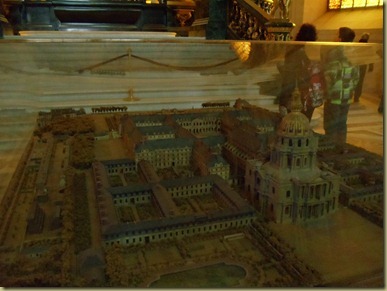





 Visitamos la sección de armaduras y armas, que recopilaba objetos del siglo XIII hasta el XVII. Me encantó la parte en la que explicaban la evolución de las armaduras al pasar del tiempo y tenían unas pistolas y espadas que eran unas verdaderas obras de arte. Otra cosa que me pareció interesante fue que incluyeran unas cuantas salas con armaduras orientales, chinas y japonesas.
Visitamos la sección de armaduras y armas, que recopilaba objetos del siglo XIII hasta el XVII. Me encantó la parte en la que explicaban la evolución de las armaduras al pasar del tiempo y tenían unas pistolas y espadas que eran unas verdaderas obras de arte. Otra cosa que me pareció interesante fue que incluyeran unas cuantas salas con armaduras orientales, chinas y japonesas.
We visited the weapons and armors sections that had objects from the XIII to the XVII centuries. I loved the part where they explained the evolution of armors with time and it had some guns and swords that were truly masterpieces. Another thing I found interesting was that they included some rooms with oriental armors, Chinese and Japanese. 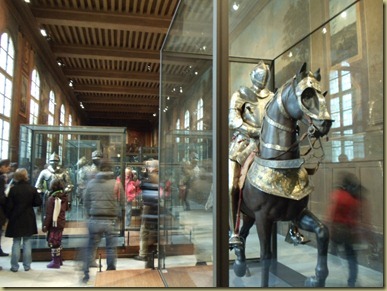

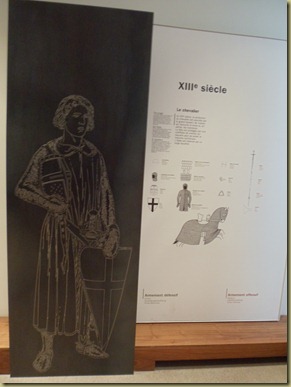


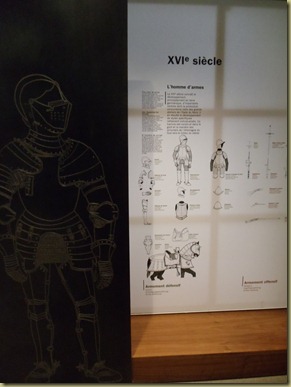
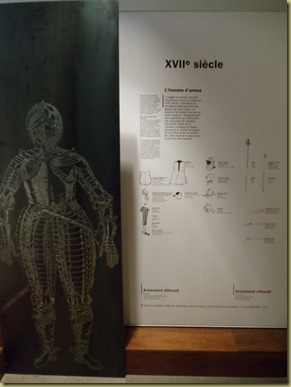



 Por razones de tiempo y hambre, nos tuvimos que saltar la sección llamada “De Louis XIV a Napoleón”, que puedo asegurar con honestidad que me hubiera gustado ver. Después de un semestre estudiando el arte en tiempos de Louis XIV, lo menos que puedo hacer es ver qué ropa/armaduras usaba. Sin embargo, saltamos directamente a la sección de las dos guerras mundiales, que fue un ligero repaso de todo lo que debería recordar en mis clases de Historia del colegio. Si mi profesor me viera en este momento estaría tan avergonzado de mí…
Por razones de tiempo y hambre, nos tuvimos que saltar la sección llamada “De Louis XIV a Napoleón”, que puedo asegurar con honestidad que me hubiera gustado ver. Después de un semestre estudiando el arte en tiempos de Louis XIV, lo menos que puedo hacer es ver qué ropa/armaduras usaba. Sin embargo, saltamos directamente a la sección de las dos guerras mundiales, que fue un ligero repaso de todo lo que debería recordar en mis clases de Historia del colegio. Si mi profesor me viera en este momento estaría tan avergonzado de mí…
Me da risa que, como buena mujer, me concentré en los uniformes de los diferentes países y me dediqué a encontrar todas esas ropas, zapatos y accesorios que están de moda en esta época y que tienen su origen en la vestimenta militar. Estuvo genial. Pero hay que decir que el museo en sí es muy interesante. Hace un gran esfuerzo por explicar con simplicidad hechos muy enredados y delicados. Encima de eso, está dotado con un montón de maquetas, videos y objetos de todo tipo que mantienen la visita interesante y novedosa. Es un paseo obligado para todos los estudiantes, de colegio o universidad, tal vez así se retienen mejor toda la cronología de eventos y sus fechas.
Because of the time and hunger, we had to leave out the section called “From Louis XIV to Napoleon” that I can honestly say I wish I had seen. After a whole semester studying art during Louis XIV, the least I could do was see what kind of clothes/armor he used. However, we jumped directly to the two world wars section, which was a light reminder of everything I should remember from my History classes in High school. If my teacher could see me right now he would be so ashamed of me…
It was very funny that, as a good woman, I concentrated mostly in the uniforms from different countries and I tried to find what clothes, shoes and accessories that are fashionable right now have their origins in military outfits. It was great. But it must be said that the museum in itself is very interesting. It does a good effort to explain in a simple way very delicate and complicated events. On top of that, it has a lot of models, videos and all kind of objects that make the visit interesting all the while. It’s a must for every student in high school or college, it will make it easier to remember all the facts and its dates.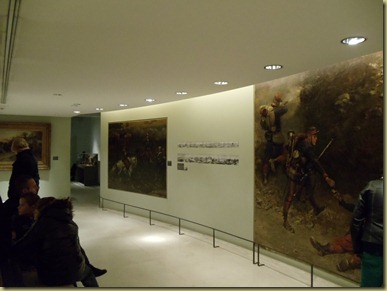

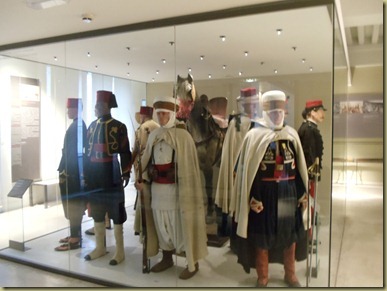


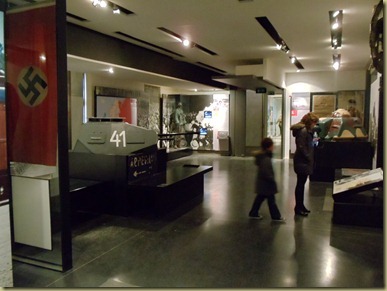
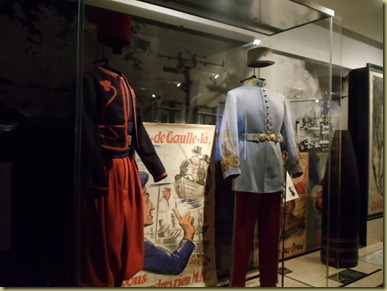

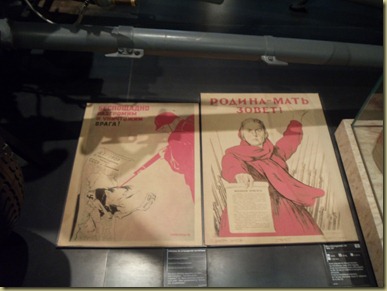






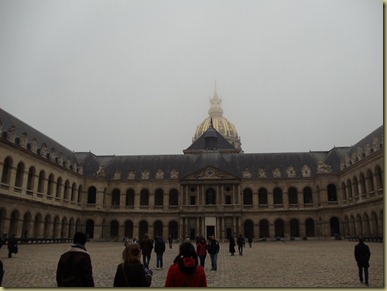 Para terminar la visita con una buena impresión, pasamos por la tienda del museo donde encontré un libro excepcional: “The ideal guide to sounding, acting and shrugging like the French” y un poster con la genealogía de los reyes de Francia que quería desde el año antepasado. En fin, el museo es altamente recomendado, hasta para los que puedan ser escépticos, como lo era yo.
Para terminar la visita con una buena impresión, pasamos por la tienda del museo donde encontré un libro excepcional: “The ideal guide to sounding, acting and shrugging like the French” y un poster con la genealogía de los reyes de Francia que quería desde el año antepasado. En fin, el museo es altamente recomendado, hasta para los que puedan ser escépticos, como lo era yo.
To end the visit with a good impression, we went to the museum shop where I found this great book: “The ideal guide to sounding, acting and shrugging like the French” and a poster with the Kings of France genealogy I wanted since 2010. Anyway, the museum is highly recommended, even for those that could be skeptical, as I used to be.
Definitivamente que tengo mucho por qué estar agradecida ya que a nuestras recetas tradicionales de las fiestas –el pollo de Herminio- en esta ocasión se le agregaron platos brasileños, chinos y hasta un pastel húngaro. Sólo por eso puedo decir que el año pasado fue unot de nuevos amigos y mejor comida.
Deseando que este sea un año igual o mejor, comparto las fotos de nuestra adorable y acogedora reunión.
I definitely have a lot to be thankful since to this our traditional holiday recipes –Herminio’s chicken- this time we got to add some Brazilian and Chinese dishes as well as a Hungarian cake. By that fact alone I can say last one was a year full of new friends and better food.
Hoping this year will be the same or even better, I share the pictures from our lovely and cozy gathering. 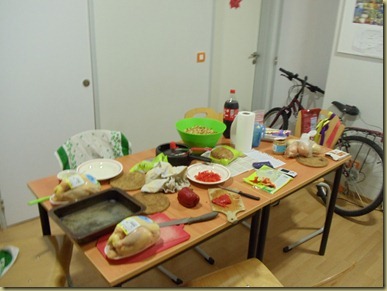
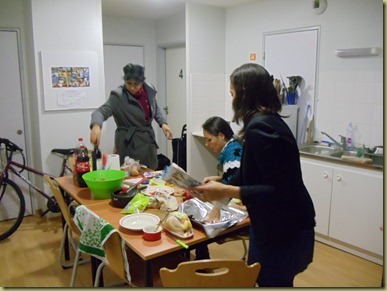


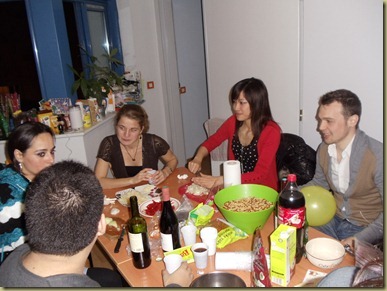



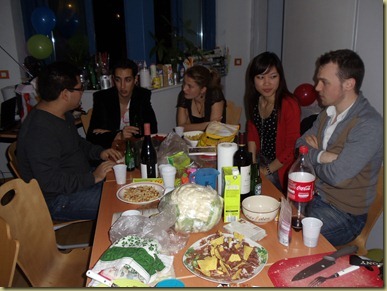

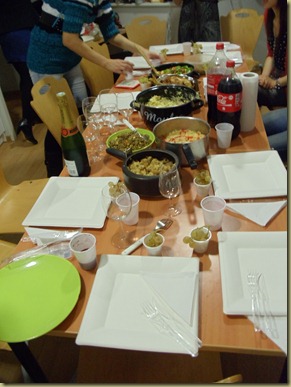








Social Icons